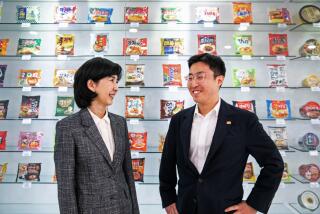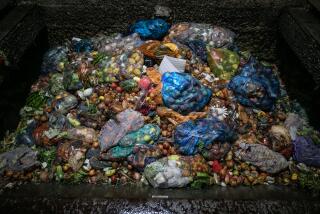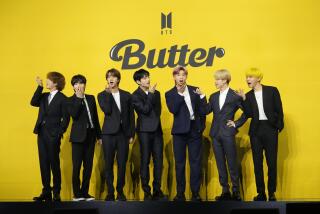Corning’s South Korea Venture Is a Big Success : Manufacturing: The operation with Samsung outperforms its U.S. parent in making glass for television tubes.
- Share via
KUMI, South Korea — Samsung, a South Korean conglomerate, is known to favor technology licensing over joint ventures, but 17 years ago it made an exception for the American firm Corning.
The result is a Korean-American offspring that has outgrown the American parent in the manufacture of glass for television tubes. Samsung Corning now ranks third in the world in this specialty while Corning, the U.S. leader, is sixth.
The joint venture has spawned a joint venture of its own, with Kaili-Chemie of West Germany, and Samsung Corning has opened a second factory at Kumi, an industrial complex 120 miles southeast of Seoul.
Growth in three new product lines--specialty glass, ceramics for integrated circuit packaging and fine chemicals--promises to increase Samsung Corning’s sales to more than $4 billion by 2000, according to Kim Ik Myung, executive managing director of the company and manager of the Kumi factory. That would be 13 times greater than last year’s $315.6 million.
Corning itself, which had sales of $2.4 billion in 1989, is not as optimistic about the future of its South Korean joint venture. Duane Welch, business development and planning manager of the Corning, N.Y.-based firm, said in a telephone interview that he expects Samsung Corning’s sales to fall short of $1 billion in 2000.
Kim acknowledged that plans to double the size of the Kumi plant by 1993 may not be realized.
“Korean political and social conditions have grown worse,” he said, “so it may take more time. But it could be finished by 1995. After all, sales for the whole Samsung Group 10 years ago were only a tenth of what they are today.”
Samsung Corning’s sales quadrupled in 1985-89. Unlike many Korean firms, which lost their price advantage in the world market because of massive wage increases and currency appreciation, “we are price-competitive,” Kim said, “and our productivity is higher than Japan’s.”
The new plant, opened two years ago, is manufacturing soft ferrite used in making videocassette drums, coated glass for flat panel displays and ceramic integrated-circuit packages. It plans to start production of silicon and gallium-arsenide wafers for semiconductors.
“All the new product lines are frontier fields in Korea,” Kim said.
Samsung Corning, with a research institute and staff of 200, is not relying on Corning for all its technology, he said, adding that the institute has developed a number of products on its own.
Corning turned over factory operations to Korean managers in 1976, three years after the joint venture was established. Welch said he and other American-based Corning executives often visit the firm, but no Corning executive has lived in South Korea since 1980.
Samsung has had trouble with other foreign partners over the years, but Kim and Welch said neither partner has asked for a change in management arrangements or in the 50-50 ownership ratio for Samsung Corning.
“We consider the relationship permanent,” Welch said. “Samsung has seen the value of our technology and wants to assure that they have access to it as time goes on. If any discussion about reducing our equity came up, we would probably take a different stance and withdraw our technology.”
With a profit-to-sales ratio of 15%, “we are happy, and Corning is equally happy,” Kim said. “We don’t have any management problems.”
More to Read
Inside the business of entertainment
The Wide Shot brings you news, analysis and insights on everything from streaming wars to production — and what it all means for the future.
You may occasionally receive promotional content from the Los Angeles Times.










